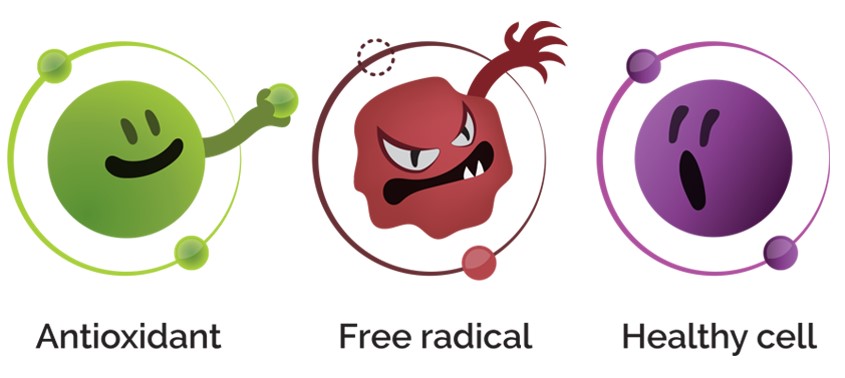
Aging is an irreversible process where the body’s replacement of dead or damaged cells slows down, causing a decline in all physiological functions of the body. Hence, the concept of anti-aging is so fascinating to us. But is it really achievable? Can we slow down the process of aging naturally using antioxidants?
Read on to know!
Let’s Understand what Aging is.
Biological systems are endowed with an immense diversity in form and function due to molecules called macromolecules. There are four types of macromolecules present in living systems. They are proteins, carbohydrates, lipids, and nucleic acids.
Hundreds, thousands, and sometimes even millions of atoms make up the bulky macromolecules. The atoms of a macromolecule are interconnected in a wide variety of different combinations. These intricate, complex interconnections make life possible on a molecular level.
Aging is partly caused by free radicals, which are produced every day in the body. Free radicals are unstable charged particles that randomly damage and destroy the bonds holding the atoms of a macromolecule together. They can even form new inappropriate bonds, which destabilize the overall macromolecule.

Free radicals, once produced, start a chain reaction resulting in the disruption of a living cell. Free radicals can form naturally in the body as a result of metabolism. Additionally, they can be produced by the body to neutralize bacteria and viruses.
Free radical production can also be due to environmental factors such as pollution, radiation, cigarette smoke, and harmful pesticides. Free radicals can damage the skin and accelerate the appearance of the visible signs of skin aging. They can also damage the skin, resulting in deep wrinkles, hyperpigmentation, chronic inflammation, abnormal elastin (a protein that provides elasticity to our skin) formation, and even cancer!
However, our body can deal with free radicals under normal circumstances. But a lack of antioxidants or excessive free radical production can cause damage. Also, free radical damage accumulates with age. Thus, antioxidants play an important role in reducing free radical damage, making them essential for anti-aging.
But what are antioxidants? How can they help in anti-aging? Read on to find out!
How do Antioxidants Work?
Antioxidants are phytochemicals (biologically active compounds in plants), vitamins, and minerals that inhibit oxidation or free radical production. These substances can occur naturally in plants, fruits, vegetables, and teas, but they can also be man-made. Some antioxidants are also naturally produced in our bodies.
Antioxidants also have the potential to lower blood pressure and reduce the development of atherosclerosis. Antioxidant-rich foods are also good for diabetic patients as they help relieve oxidative stress. Antioxidant molecules neutralize free radicals by accepting or donating an electron to eliminate their unpaired condition. They are natural scavengers of free radicals, known to cause cellular damage and, consequently, age-related medical disorders and skin problems. This helps protect the cells against oxidative damage and increases their longevity and vitality.

Our skin ideally uses certain antioxidant compounds that protect us against free-radical damage. These are naturally present antioxidant compounds (enzymes) such as glutathione peroxidase, glutathione, coenzyme Q10 (ubiquinone-10), and Alpha Lipoic Acid (ALA).
Some Important Antioxidants that can help in Anti-Aging
- Vitamin A: Vitamin A, or retinol, is one of the most popular anti-aging ingredients. It is abundant in foods like liver, carrots, sweet potatoes, and tomatoes. Retinol improves skin resilience, which contributes to its overall feeling of firmness and a more youthful, healthy appearance. It also minimizes the appearance of fine lines, wrinkles, dullness, and uneven skin tone.
- Vitamin C: This potent anti-oxidant present in citrus fruits, spinach, cabbage, and garlic helps fight free radicals. It also boosts collagen formation. Both of these processes are important in preserving and maintaining the skin’s youthful appearance.
- Vitamin E: Vitamin E is present in vegetable oils, legumes, almonds, and avocados. They help the skin look younger by boosting collagen production. This helps reduce the appearance of fine lines, wrinkles, and age spots.
- Lycopene: This carotenoid is abundantly present in red tomatoes and tomato products. It helps improve skin texture by promoting collagen production and reducing DNA damage.

Exposure to UV radiation depletes the antioxidant protection of the body. This eventually results in skin aging. About 80% of signs of skin aging are a result of unprotected long-term exposure to the sun.
You can consume antioxidants from natural food sources and supplements. Foods contain a plethora of antioxidants and other phytochemicals that are not present in a single supplement pill. You can obtain a variety of antioxidants naturally from fruits, vegetables, herbs, teas, legumes, and whole-grain cereals. Thus, nutrition plays an important role in delaying such changes or preventing their progression.
So, is Antioxidant Supplementation the only way to go?
Not quite. Supplementing your skin with additional antioxidants can give you additional protection from sun-induced damage. It can also slow down skin aging and reduce inflammation. It can even improve skin health.
Topical antioxidants (anti-aging creams, lotions, and sunscreens) and supplement pills have the antioxidant properties of a diverse variety of compounds, such as Superoxide Dismutase (SOD), resveratrol, and vitamins C and E. They also include various plant extracts, such as acai berry, white and green tea, rosemary, and turmeric.

Topical antioxidants can reduce the incidence of free radical-induced photocarcinogenesis and photoaging. They also protect your skin against sunburn, suntan, and skin cancer, and they reverse pigmentation and wrinkles from photoaging.
Thus, it’s important to eat a well-balanced diet rich in different antioxidants to make your skin healthy, prevent age-related disorders, and reduce signs of aging naturally. Combining topical antioxidant treatments with this reduces visible signs of aging quickly and efficiently.
Disclaimer: High doses of antioxidant supplementation can have adverse effects. A doctor’s consultation is advisable before taking antioxidant supplements.


.png)


